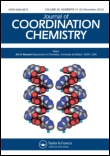
JOURNAL OF COORDINATION CHEMISTRY
metrics 2024
Advancing Knowledge in Coordination Chemistry Since 1971
Introduction
JOURNAL OF COORDINATION CHEMISTRY is a prestigious academic journal published by Taylor & Francis Ltd, focusing on the vital intersection of materials chemistry and physical and theoretical chemistry. Since its inception in 1971, the journal has provided a platform for disseminating high-quality research that explores the coordination chemistry of metals and its implications in various scientific domains. With an ISSN of 0095-8972 and an E-ISSN of 1029-0389, this journal serves a diverse community of researchers and professionals dedicated to advancing their understanding of coordination compounds and their applications. The journal's current rankings place it in the Q3 category for both Materials Chemistry and Physical and Theoretical Chemistry, with Scopus rankings highlighting its relevance and contribution to these fields. The absence of open access underscores the journal's commitment to maintaining rigorous academic standards while ensuring a broad reach through reputable publication practices. As it converges toward 2024, JOURNAL OF COORDINATION CHEMISTRY invites contributions that push the boundaries of knowledge and foster innovative research in multiple contextual applications.
Metrics 2024
 0.31
0.31 2.20
2.20 1.90
1.90 59
59Metrics History
Rank 2024
Scopus
IF (Web Of Science)
JCI (Web Of Science)
Quartile History
Similar Journals
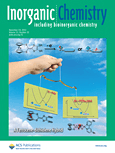
INORGANIC CHEMISTRY
Exploring Innovative Pathways in Inorganic ResearchInorganic Chemistry, published by the American Chemical Society, stands at the forefront of the field of inorganic and physical chemistry, boasting an impressive impact in the academic community with a 2023 classification in the Q1 quartile across multiple categories including Inorganic Chemistry and Miscellaneous Chemistry. Since its inception in 1962, this esteemed journal has been a crucial platform for disseminating groundbreaking research, innovative methodologies, and comprehensive reviews integral to understanding the complex behaviors of inorganic materials. With a ranking of #12 out of 79 in Inorganic Chemistry and #37 out of 189 in Physical and Theoretical Chemistry according to Scopus metrics, Inorganic Chemistry has established itself as a premier destination for researchers, professionals, and students alike, eager to stay abreast of pivotal developments and trends in the discipline. Despite being a subscription-based journal, its esteemed reputation and critical contributions make it essential for anyone engaged in the exploration of inorganic chemical phenomena. As it prepares to converge into a new era by 2024, the journal continues to embody excellence and innovation, fostering a dynamic exchange of ideas essential for advancing this vibrant area of science.

JOURNAL OF CHEMICAL CRYSTALLOGRAPHY
Exploring the intricate connections between chemistry and physics.Welcome to the Journal of Chemical Crystallography, a prominent publication dedicated to the advancement of knowledge in the fields of chemical crystallography, general chemistry, and condensed matter physics. Published by Springer/Plenum Publishers, this journal provides a critical platform for researchers, professionals, and students to disseminate and access innovative research findings and methodologies from 1994 to 2024. With an ISSN of 1074-1542 and E-ISSN 1572-8854, the journal currently holds a Q4 quartile ranking in both Chemistry and Condensed Matter Physics, reflecting its broadening scope and niche significance within the scientific community. While it operates under a traditional access model, it endeavors to promote high-quality research that advances theoretical and practical aspects of crystallography, making it an essential resource for those involved in these dynamic disciplines. Join us as we explore the intricate world of chemical structures and their properties, bridging gaps between chemistry and physics.

RUSSIAN JOURNAL OF INORGANIC CHEMISTRY
Unveiling Innovations in Materials ChemistryThe Russian Journal of Inorganic Chemistry is a distinguished publication that delves into the fundamental and applied aspects of inorganic chemistry. Published by MAIK Nauka/Interperiodica/Springer, this journal has established itself as a vital resource for researchers, professionals, and students alike, contributing significantly to the fields of Inorganic Chemistry, Materials Science, and Physical and Theoretical Chemistry. With an ISSN of 0036-0236 and an E-ISSN of 1531-8613, the journal is indexed for easy access and citation. Though the journal currently operates under a subscription model, its commitment to disseminating high-quality research and fostering scientific discourse remains steadfast. The journal has been maintaining a consistent record since its inception, and its positioning in the Q3 quartile across various chemistry categories in 2023 underscores its relevance in the academic community. As it continues through its converged years from 1996 to 2024, the Russian Journal of Inorganic Chemistry plays a pivotal role in enhancing the understanding and advancement of inorganic chemistry, making it an indispensable tool for anyone engaged in this dynamic field.

RUSSIAN JOURNAL OF COORDINATION CHEMISTRY
Advancing Knowledge in Coordination ChemistryThe Russian Journal of Coordination Chemistry, published by Pleiades Publishing Inc, stands as a significant contribution to the field of coordination chemistry, focusing on the intricate relationships between metal ions and organic molecules. With an ISSN of 1070-3284 and an E-ISSN of 1608-3318, this journal has been curating high-quality research since its inception in 1996. Though it currently does not offer open access, the journal plays a crucial role in disseminating innovative findings, evidenced by its Q3 ranking in both Chemical Engineering and Chemistry categories as of 2023. With Scopus rankings placing it in the 40th percentile among general chemistry and chemical engineering journals, it demonstrates a commitment to advancing knowledge in these vital areas. The journal invites researchers, professionals, and students alike to engage with its comprehensive articles that explore both theoretical and practical aspects of coordination chemistry, supporting the development of new applications and techniques within the field.
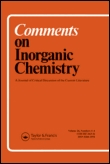
COMMENTS ON INORGANIC CHEMISTRY
Unveiling Innovations in Inorganic ResearchCOMMENTS ON INORGANIC CHEMISTRY is a prestigious academic journal published by Taylor & Francis Ltd, specializing in the dynamic field of inorganic chemistry. With an impressive impact factor placing it in the Q1 category, this journal ranks #6 out of 79 in its field, reflecting its high influence and contribution to the discipline, with a remarkable percentile ranking of 93rd. Since its inception in 1981 and spanning publications until 2024, this journal serves as a crucial platform for researchers, professionals, and students to disseminate groundbreaking findings, review articles, and discussions on contemporary topics in inorganic chemistry. Although it is not an Open Access journal, the rigorous peer-review process ensures the publication of high-quality research. By bridging theoretical and practical aspects of inorganic chemistry, COMMENTS ON INORGANIC CHEMISTRY remains an essential resource for advancing knowledge and fostering innovation within the scientific community.
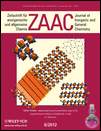
ZEITSCHRIFT FUR ANORGANISCHE UND ALLGEMEINE CHEMIE
Pioneering Research in Inorganic and General ChemistryZEITSCHRIFT FUR ANORGANISCHE UND ALLGEMEINE CHEMIE, published by WILEY-V C H VERLAG GMBH, is a pivotal journal in the field of inorganic chemistry, catering to the needs of researchers, professionals, and students seeking to advance their understanding of this dynamic discipline. With its historical roots dating back to 1892 and a commitment to high-quality research, this journal provides a platform for the dissemination of significant findings related to inorganic substances and their general chemistry. Although currently not an open-access journal, it holds a competitive position with an impact factor placing it in the Q3 quartile of the Inorganic Chemistry category, ranking #57 out of 79 in Scopus. Situated in Germany, this journal not only connects past and present research endeavors but also aims to foster innovation and collaboration within the inorganic chemistry community. Whether you are exploring fundamental concepts or groundbreaking applications, ZEITSCHRIFT FUR ANORGANISCHE UND ALLGEMEINE CHEMIE remains an invaluable resource for advancing chemical sciences.

BIOINORGANIC CHEMISTRY AND APPLICATIONS
Unlocking the potential of inorganic chemistry in biological systems.BIOINORGANIC CHEMISTRY AND APPLICATIONS, published by HINDAWI LTD, is a distinguished journal dedicated to advancing the field of bioinorganic chemistry, offering an open access platform since 2008. With an ISSN of 1565-3633 and E-ISSN of 1687-479X, this journal provides a global forum for researchers, practitioners, and scholars in the vibrant fields of Biochemistry, Inorganic Chemistry, and Organic Chemistry. Recognized for its scholarly impact, it holds an impressive Q2 rank in Biochemistry and Q1 ranks in both Inorganic and Organic Chemistry in the 2023 metrics. Catering to a diverse audience, the journal emphasizes the importance of interdisciplinary research and the application of inorganic chemistry in biological systems. With an accessible range of articles aimed at fostering scientific dialogue and innovation, BIOINORGANIC CHEMISTRY AND APPLICATIONS plays a crucial role in shaping future research and application in the chemical sciences.

Inorganic and Nano-Metal Chemistry
Exploring the Frontiers of Inorganic and Nano-Metal Innovations.Inorganic and Nano-Metal Chemistry is a premier journal published by Taylor & Francis Inc, focusing on innovative research and advancements in the fields of inorganic chemistry and nano-metal applications. With an increasing impact in the academic community, this journal has established itself within the Q3 category of both Inorganic Chemistry and Physical and Theoretical Chemistry as of 2023, reflecting its global recognition and influence. The journal is accessible as an Open Access publication, ensuring that research findings are freely available to a broad audience, promoting transparency and collaboration in scientific exploration. Based in the United Kingdom, Inorganic and Nano-Metal Chemistry aims to disseminate high-quality peer-reviewed articles that not only highlight fundamental studies but also push the boundaries of technological applications in areas such as catalysis, materials science, and nanotechnology. Researchers, professionals, and students will find this journal an invaluable resource for the latest developments and interdisciplinary insights in the ever-evolving landscape of inorganic and nano-metal chemistry.
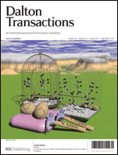
DALTON TRANSACTIONS
Catalyzing Collaboration in Chemical ResearchDALTON TRANSACTIONS, published by the esteemed Royal Society of Chemistry, is a premier journal in the field of Inorganic Chemistry, recognized for its significant contributions to advancing research and scholarship since its inception in 2002. With an impressive Impact Factor and ranked in the Q1 category, it holds a notable position at Rank #21 out of 79 within its Scopus category, highlighting its reputation for excellence and influence in the scientific community. This journal provides a platform for disseminating high-quality research, reviews, and communications related to all aspects of inorganic chemistry, fostering collaboration and innovation among researchers, professionals, and students alike. Although it does not offer open access, its robust selection process and commitment to scholarly integrity ensure that published works are of the highest standard. For those passionate about inorganic chemistry, DALTON TRANSACTIONS serves as an essential resource, fostering a deeper understanding of the field and its applications.
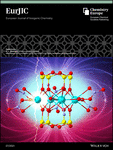
EUROPEAN JOURNAL OF INORGANIC CHEMISTRY
Fueling Collaboration and Innovation in Inorganic ChemistryThe EUROPEAN JOURNAL OF INORGANIC CHEMISTRY, published by WILEY-V C H VERLAG GMBH, is a premier peer-reviewed journal dedicated to advancing the field of inorganic chemistry. With an ISSN of 1434-1948 and an E-ISSN of 1099-0682, this journal has established itself as a key platform for the dissemination of innovative research, reviews, and features since its inception. As of 2023, it holds a respectable Q2 quartile ranking in the domain of inorganic chemistry, reflecting its influence and contribution to the scientific community—ranking #33 out of 79 in Scopus’ assessment and placing the journal in the 58th percentile. The journal encompasses a wide range of topics within inorganic chemistry, making it a valuable resource for researchers, professionals, and students alike. Although the journal does not currently offer open access, it remains an essential outlet for high-quality, impactful studies in inorganic chemistry, showcasing significant advancements and fostering collaboration among scholars globally.